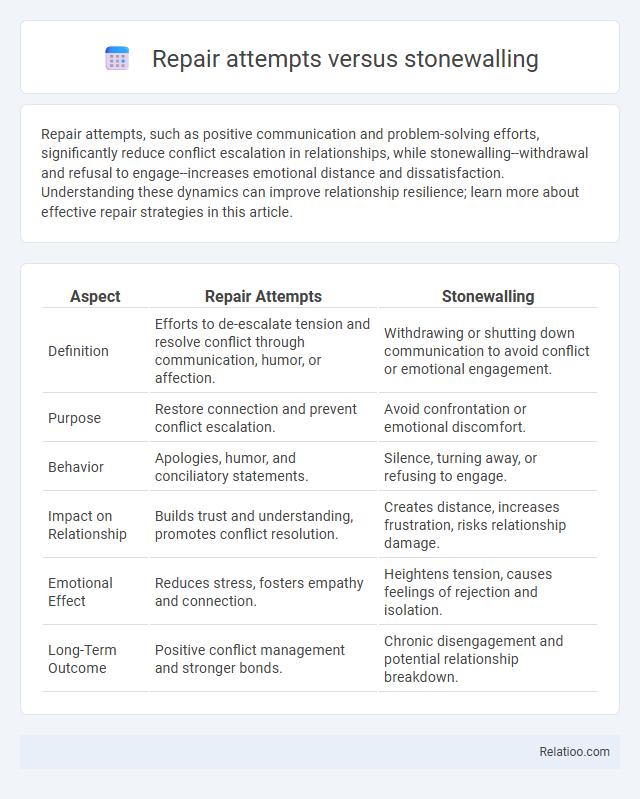Repair attempts, such as positive communication and problem-solving efforts, significantly reduce conflict escalation in relationships, while stonewalling--withdrawal and refusal to engage--increases emotional distance and dissatisfaction. Understanding these dynamics can improve relationship resilience; learn more about effective repair strategies in this article.
Table of Comparison
| Aspect | Repair Attempts | Stonewalling |
|---|---|---|
| Definition | Efforts to de-escalate tension and resolve conflict through communication, humor, or affection. | Withdrawing or shutting down communication to avoid conflict or emotional engagement. |
| Purpose | Restore connection and prevent conflict escalation. | Avoid confrontation or emotional discomfort. |
| Behavior | Apologies, humor, and conciliatory statements. | Silence, turning away, or refusing to engage. |
| Impact on Relationship | Builds trust and understanding, promotes conflict resolution. | Creates distance, increases frustration, risks relationship damage. |
| Emotional Effect | Reduces stress, fosters empathy and connection. | Heightens tension, causes feelings of rejection and isolation. |
| Long-Term Outcome | Positive conflict management and stronger bonds. | Chronic disengagement and potential relationship breakdown. |
Understanding Repair Attempts in Communication
Repair attempts in communication are deliberate efforts made by one or both parties to de-escalate tension and resolve misunderstandings during conflicts. Stonewalling, characterized by withdrawal and refusal to engage, often obstructs these repair efforts, increasing emotional distance and reducing the likelihood of resolution. Recognizing and responding positively to repair attempts facilitates constructive dialogue and promotes healthier relationship dynamics.
Defining Stonewalling in Relationships
Stonewalling in relationships occurs when one partner withdraws emotionally and physically, refusing to engage in communication or conflict resolution, often leading to increased tension and unresolved issues. Repair attempts are efforts made by either partner to de-escalate conflict through gestures like apologies, humor, or affirmations aimed at restoring connection and understanding. Frequent repair attempts can mitigate the harmful impact of stonewalling by encouraging openness and fostering emotional responsiveness, which strengthens relationship resilience.
The Psychological Impact of Repair Attempts
Repair attempts in relationships demonstrate proactive efforts to resolve conflicts and restore emotional connection, significantly reducing the risk of chronic dissatisfaction and emotional withdrawal. Stonewalling, characterized by emotional unavailability and avoidance, disrupts these repair efforts, leading to increased frustration and feelings of rejection in partners. Effective repair attempts promote psychological resilience by fostering trust and emotional security, counteracting the negative impact of stonewalling on relational wellbeing.
How Stonewalling Sabotages Relationship Growth
Stonewalling, characterized by emotional withdrawal and refusal to engage, sabotages relationship growth by blocking effective repair attempts, which are critical for resolving conflicts and restoring trust. Your repair attempts, such as expressing empathy or offering solutions, create opportunities for connection and healing, but stonewalling negates these efforts by shutting down communication and increasing emotional distance. Persistent stonewalling leads to frustration and disconnect, preventing the couple from overcoming challenges and deepening their bond.
Common Examples of Repair Attempts
Common examples of repair attempts include apologizing after a disagreement, using humor to diffuse tension, and offering reassurance or validation to a partner's feelings. These attempts help de-escalate conflicts by signaling willingness to reconcile and maintain connection. In contrast, stonewalling involves withdrawing or shutting down communication, which blocks resolution and deepens emotional distance.
The Warning Signs of Stonewalling Behavior
Stonewalling behavior often manifests as dismissive silence, avoiding eye contact, or physically withdrawing during conflicts, signaling emotional shutdown. Repair attempts aim to de-escalate tensions through empathy, compromise, or open communication, contrasting sharply with stonewalling's defensiveness. Recognizing these warning signs helps you address relationship breakdowns early, fostering healthier conflict resolution and emotional connection.
Repair Attempts vs. Stonewalling: Key Differences
Repair attempts involve efforts to de-escalate conflict and reconnect emotionally, often through apologies, humor, or expressing understanding. Stonewalling occurs when one party withdraws from interaction, refusing to engage or communicate, which creates emotional distance and hinders conflict resolution. Your ability to recognize and respond to repair attempts rather than resorting to stonewalling significantly impacts relationship stability and emotional health.
Consequences of Ignoring Repair Attempts
Ignoring repair attempts in relationships often leads to increased emotional distance and escalates conflicts, causing a breakdown in communication. Stonewalling, or refusing to engage, intensifies feelings of frustration and helplessness, which can result in long-term relational damage. Persistent neglect of repair efforts correlates with higher divorce rates and significantly reduces relationship satisfaction.
Strategies to Overcome Stonewalling
Stonewalling, a defensive reaction characterized by withdrawal and silence, often hinders effective communication and relationship repair. Implementing repair attempts, such as expressing understanding and taking responsibility, can disrupt stonewalling cycles and promote emotional connection. Your proactive strategy should include recognizing signs of stonewalling, encouraging open dialogue, and practicing patience to rebuild trust and foster resolution.
Strengthening Relationships Through Effective Repair Attempts
Repair attempts play a crucial role in strengthening relationships by addressing conflicts constructively before stonewalling occurs, which often leads to emotional withdrawal and unresolved issues. By recognizing and responding positively to your partner's repair attempts, you create a foundation of trust and open communication that reduces the likelihood of stonewalling. Prioritizing effective repair attempts enhances emotional connection and resilience, fostering a healthier and more enduring relationship dynamic.

Infographic: Repair attempts vs Stonewalling
 relatioo.com
relatioo.com